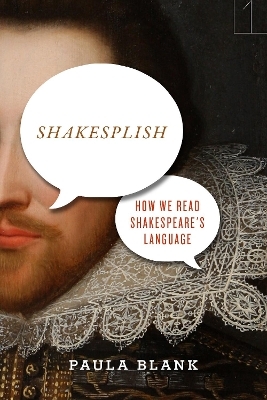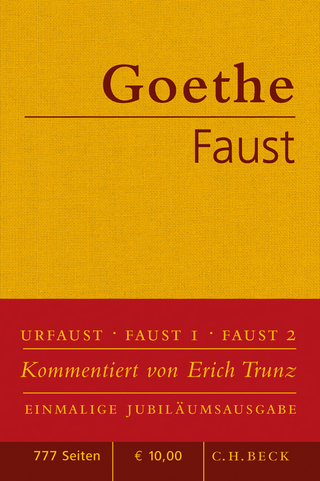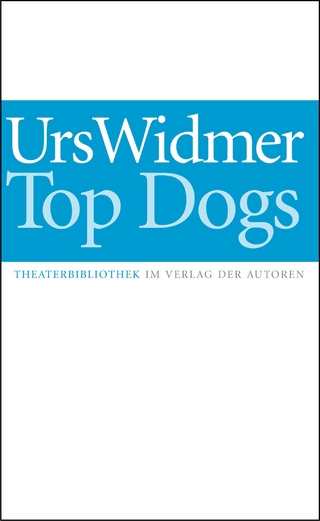
Shakesplish
Stanford University Press (Verlag)
978-0-8047-9193-9 (ISBN)
For all that we love and admire Shakespeare, he is not that easy to grasp. He may have written in Elizabethan English, but when we read him, we can't help but understand his words, metaphors, and syntax in relation to our own. Until now, explaining the powers and pleasures of the Bard's language has always meant returning it to its original linguistic and rhetorical contexts. Countless excellent studies situate his unusual gift for words in relation to the resources of the English of his day. They may mention the presumptions of modern readers, but their goal is to correct and invalidate any false impressions. Shakesplish is the first book devoted to our experience as modern readers of Early Modern English. Drawing on translation theory and linguistics, Paula Blank argues that for us, Shakespeare's language is a hybrid English composed of errors in comprehension—and that such errors enable, rather than hinder, some of the pleasures we take in his language. Investigating how and why it strikes us, by turns, as beautiful, funny, sexy, or smart, she shows how, far from being the fossilized remains of an older idiom, Shakespeare's English is also our own.
Paula Blank (1959–2016) was Margaret L. Hamilton Professor of English at the College of William and Mary and the author of Broken English (1996) and Shakespeare and the Mismeasure of Man (2006).
Contents and Abstracts1"Shakespeare in Modern English" chapter abstractThis chapter lays the groundwork for approaching Shakespeare's English from the perspective of our own, drawing on translation theory, second-language acquisition theory, and performance studies. It destabilizes the argument over whether Shakespeare should or should not be translated into modern English by posing the theory that Shakespeare's English, in our reception of it, has become an "interlanguage," a uniquely modern hybrid.
2"Beautiful" chapter abstractThis chapter attempts to account for our continuing sense of Shakespeare's language as "beautiful" in an age in which the traditional aesthetic categories of "beautiful" and "sublime" have given way to new categories, such as "cute" or "interesting." Starting from the premise that, when it comes to Shakespeare, we are closer to eighteenth-century critics than twenty-first century ones, this chapter posits that our best chance of determining what it is that makes Shakespeare's language beautiful lies in considering what happens in the moment we make contact with his texts, the moment of our interlinguistic participation. Focusing on our experience of belatedness in relation to Shakespeare's Early Modern diction and syntax, this chapter examines various examples of Shakespeare's beautiful—and not so beautiful—language in order to determine the source of our aesthetic pleasure.
3"Sexy" chapter abstractThis chapter shows that Shakespeare's language is more openly sexual, when it is sexual, than our Modern English expectations have led us to believe. Early Modern English lacked "clinical" terms for male and female sexual organs and for the act of sexual intercourse itself. When Shakespeare uses terms like "sport" or "dally" for sex, he is speaking directly rather than euphemistically. This chapter argues that our interest in Shakespeare's sexual language actually reveals our ambivalence toward his original sexual frankness: We prefer sex in Shakespeare be hidden, so that we can find it out for ourselves. For us, Shakespeare's sexual language is, in itself, a metaphor for our idea of Shakespeare's text as coded, hiding some essential "truth."
4"Funny" chapter abstractThis chapter explores the "funny" and "unfunny" effects of Modern English on Shakespeare's comedy. Situating Shakespeare's jokes within the context of several dominant, enduring theories of humor in the Western tradition—including "superiority" theories, "arousal" or "release" theories, and "incongruity" theories—the chapter explains why and how it is that some of Shakespeare's comedy falls flat to contemporary ears while other instances have become more funny as a result of the gap between our English and Shakespeare's.
5"Smart" chapter abstractThis chapter examines Shakespeare's "intelligence effects," the ways in which his language gives us a sense of depth and acuity. Shakespeare did not use the word "intelligence" in the way that we do: in Early Modern English, the key terms were "wit" and "discourse of reason." Often, modern readers find Shakespeare's characters' "intelligent" because they demonstrate inwardness and self-consciousness; in the process, however, we miss their many failures of logic, which for Shakespeare's audience would have indicated a failure of reason. The chapter further argues that Shakespeare's poetic syntax makes him sound "smarter" to us.
6"Shakespeare as Modern English" chapter abstractThis chapter focuses on Modern English phrases that derive from Shakespeare's Early Modern English, but have been adapted to more recent forms of the vernacular, either in meaning or form. Modern English includes many idioms that originate in Shakespeare, such as "hoist with his own petard," "one fell swoop," and "primrose path." This chapter divides such idioms into three categories: those whose literal meaning is now obscure to us, those that we hear simply as Modern English, and those that sound antiquated and clichéd. Finally, the chapter returns to our modern obsession with identifying idioms as Shakespearean. Cited so often, in so many contexts, over so many centuries, these phrases have become their own particular suborder of language. They are far more ours than his, not Shakespeare but "Shakespeare."
| Erscheinungsdatum | 17.10.2018 |
|---|---|
| Reihe/Serie | Square One: First-Order Questions in the Humanities |
| Verlagsort | Palo Alto |
| Sprache | englisch |
| Maße | 152 x 229 mm |
| Themenwelt | Literatur ► Lyrik / Dramatik ► Dramatik / Theater |
| Geisteswissenschaften ► Sprach- / Literaturwissenschaft ► Anglistik / Amerikanistik | |
| Geisteswissenschaften ► Sprach- / Literaturwissenschaft ► Literaturgeschichte | |
| Geisteswissenschaften ► Sprach- / Literaturwissenschaft ► Literaturwissenschaft | |
| Geisteswissenschaften ► Sprach- / Literaturwissenschaft ► Sprachwissenschaft | |
| ISBN-10 | 0-8047-9193-7 / 0804791937 |
| ISBN-13 | 978-0-8047-9193-9 / 9780804791939 |
| Zustand | Neuware |
| Haben Sie eine Frage zum Produkt? |


